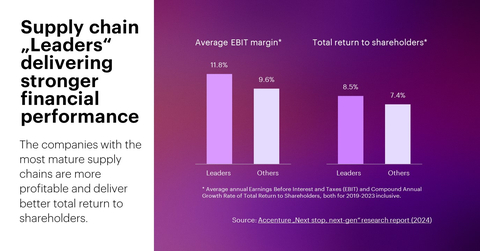Companies with Next-Generation Supply Chain Capabilities Achieve 23% Greater Profitability, Shows New Research from Accenture
Analysis also reveals alarmingly low supply chain maturity among many organizations with limited ability to benefit from AI and generative AI as a consequence

Leaders with more mature supply chains deliver stronger financial performance, shows new research from Accenture (Graphic: Business Wire)
For the report, “Next stop, next-gen,” Accenture analyzed 1,148 companies across 15 countries and 10 industries. It defines supply chain maturity as the extent to which companies have supply chain capabilities that use generative AI, advanced machine learning and other evolving technologies for autonomous decision-making, advanced simulations and continuous improvement. These capabilities enable companies to adapt more readily to changes as they happen and adopt other new technologies seamlessly as they emerge.
The report shows that “Leaders”—the
“Leaders are investing heavily in increasingly sophisticated technologies—especially AI and generative AI—to build the next generation of supply chain capabilities,” said Max Blanchet, Accenture’s global strategy lead for supply chains and operations. “These capabilities are essential to reinvent supply chains for efficiency, agility, sustainability and resilience. They enable leaders to move beyond traditional supply chain drivers consisting of cost, quality and delivery, which is causing many supply chain vulnerabilities and inefficiencies today and in the future.”
While only
However, the bigger picture painted in the report is alarming. While the average supply chain maturity score has jumped by more than
“If we compare supply chain maturity to the evolution of navigation—from following the stars to driving semi-autonomous vehicles—many of us are still running supply chains on a mix of paper maps and first-generation satnavs,” said Melissa Twining-Davis, Accenture’s global operations lead for supply chains. “The next-generation capabilities that exist, such as generative design to develop products, highly automated facilities to produce them, and advanced analytics and machine learning to predict supply roadblocks, are just at the beginning. The reinvention potential ahead is massive.”
According to the report, these are the supply chain capabilities companies need to be competitive in today’s economic context. They no longer operate in a time of stable economic growth and frictionless globalization. This means the old supply chain levers, such as global low-cost sourcing and specialized factories in low-cost locations, aren’t sufficient anymore.
Max Blanchet added: “Reinventing supply chains requires the ability to, for example, monitor suppliers up to the fourth and fifth tier in near-real-time to anticipate risks, change the production on short notice, and simulate the entire lifecycle of a product. Next-generation supply chains will autonomously adapt to change and be sustainable by design. Companies with supply chain maturity scores of
Explore the report in Accenture’s thought leadership app, Foresight, and get a personalized feed of recent latest insights, data, case studies, blogs and more. Download the app at http://www.accenture.com/foresight.
About the research
The “Next stop, next-gen” research is based on a survey conducted October 2023 among more than 3,000 supply chain executives in 1,148 companies. Respondents were from the following countries:
About Accenture
Accenture is a leading global professional services company that helps the world’s leading businesses, governments and other organizations build their digital core, optimize their operations, accelerate revenue growth and enhance citizen services—creating tangible value at speed and scale. We are a talent- and innovation-led company with approximately 750,000 people serving clients in more than 120 countries. Technology is at the core of change today, and we are one of the world’s leaders in helping drive that change, with strong ecosystem relationships. We combine our strength in technology and leadership in cloud, data and AI with unmatched industry experience, functional expertise and global delivery capability. We are uniquely able to deliver tangible outcomes because of our broad range of services, solutions and assets across Strategy & Consulting, Technology, Operations, Industry X and Song. These capabilities, together with our culture of shared success and commitment to creating 360° value, enable us to help our clients reinvent and build trusted, lasting relationships. We measure our success by the 360° value we create for our clients, each other, our shareholders, partners and communities. Visit us at www.accenture.com.
Copyright © 2024 Accenture. All rights reserved. Accenture and its logo are trademarks of Accenture.
View source version on businesswire.com: https://www.businesswire.com/news/home/20240708776537/en/
Jens Derksen
Accenture
+49 175 57 61393
jens.derksen@accenture.com
Source: Accenture







